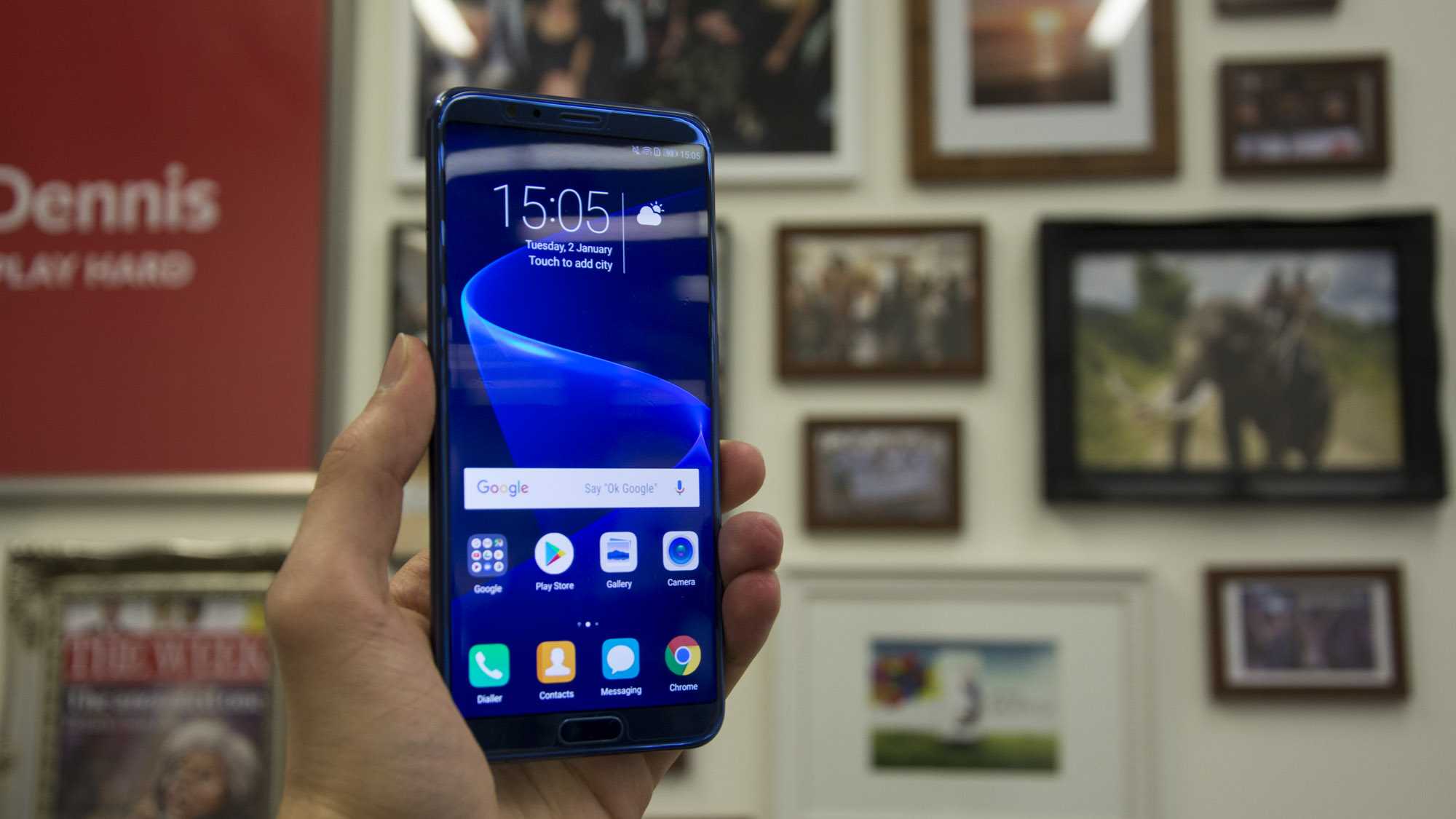Honor launched its latest flagship phone, the Honor 9, in July 2017. This incredible phone went head to head with the OnePlus 5 and narrowly lost out to its rival in two key areas: in camera and battery performance. Since then, both companies launched new 18:9 handsets, the OnePlus 5T and Honor View 10 (on review here) and they’re both in direct competition once again.
Since my original review in December 2017, Honor has added full face unlock capabilities. This feature wasn't available at launch and now, you can unlock your View 10 with your face - it works flawlessly and is incredibly fast.
The View 10 has also dropped in price – now available for around £425, down from £450. This might seem like a great deal, but other companies have all slashed their prices, too. Read on to find out more.
READ NEXT: Honor 7X review: The new mid-range smartphone king with an 18:9 display
Honor View 10 review: What you need to know
This time, the two phones are even closer together than before. The Honor View 10 is a 5.99in smartphone with an 18:9 display, just like the OnePlus 5T. Both phones have 1,080 x 2,160 resolution screens as well and neither has waterproofing.
It isn’t entirely identical, though, with a different-looking design reminiscent of the Honor 8 Pro, a HiSilicon Kirin 970 CPU, 6GB of RAM and 128GB of storage as standard compared with the OnePlus 5T’s 64GB. Other key points of difference include 256GB of storage expansion support via microSD (the OnePlus 5T has no storage expansion).

Honor View 10 review: Price and competition
The View 10 is available in select countries. In the UK, the Honor View 10 now costs around £425 . It initially launched for £450 on the Hihonor store .
That's roughly the same price as the 64GB OnePlus 5T , which is available globally. Alternatives at around the same size are the S8 Plus for £535 and the Huawei Mate 10 Pro for £529 and, if you don’t mind going with a smaller device, there’s also the Samsung Galaxy S8 for £455 and the Honor 9 for £289 .


READ NEXT: Honor 9 review: A reasonably priced alternative to the OnePlus 5
Honor View 10 review: Design and build quality
The first thing you’ll notice when you pick up the 6.97mm-thin View 10 is its large 5.99in 18:9 LTPS IPS display and thin bezels. Unlike the Samsung Galaxy S8, the View 10’s display doesn’t roll off the edges but it’s still a striking phone.
The design of the chassis is a bit of a throwback, however. Instead of improving on the glass-backed Honor 9 and 8, the View 10 adopts the Honor 8 Pro’s aluminium rear panel. I prefer this, as the View 10 is much less prone to fingerprint smudging and doesn’t need constant cleaning. It’s available in two colours: Navy Blue, which is Honor’s signature colour and Midnight Black.
The fingerprint sensor squeezes its way onto the front below the display but this isn’t a move I approve of. At least it’s quick, though, and as with the Huawei P10 and P10 Plus it also supports swipe and tap gestures for navigation (swipe left for home, right for recent apps and tap to go back), which means you can ditch the on-screen buttons and make the most of the phone’s big display.
It’s also good to see that Honor has retained a 3.5mm jack (on the bottom edge), a feature that’s inexplicably being removed by some manufacturers, including Honor’s parent company Huawei on the Mate 10 Pro. There’s also a USB Type-C port here with fast-charging capabilities and support for Honor’s 5V/4.5A Supercharge scheme, plus NFC and dual-SIM 4G capabilities.
The secondary SIM slot can be sacrificed for a microSD card, with which you can expand the phone’s 128GB of internal storage with an additional 256GB of space. The one big miss in terms of features is a lack of waterproofing. Unlike the Samsung Galaxy S8 or S8 Plus, you’ll not be able to take this into the pool and snap away.
READ NEXT: Best smartphones of 2017 – our pick of the best
Honor View 10 review: Display
The View 10’s 5.99in LTPS IPS display has the same 1,080 x 2,160 resolution (403ppi pixel density) as the OnePlus 5T and its elongated 18:9 aspect ratio is a real treat over regular-sized 16:9 phones, especially for watching movies.
The View 10’s resolution is no match for the Samsung Galaxy S8’s 1,440 x 2,960 (570ppi pixel density). But, having used both phones, I’d say you’re not missing out on much. Only if you plan on using a VR headset will you see much difference in day to day use.
In terms of image quality, however, there’s a bigger gulf between the phones. The View 10’s display has two colour modes: Normal and Vivid. The former saturates colours but reduces the maximum brightness from 451cd/m² to 404cd/m² which increases readability in bright conditions very slightly. That’s about the same as the OnePlus 5T which posts a score of around 420cd/m2 in its default mode but can’t compete with the S8’s hugely impressive peak brightness of over 900cd/m2.
Switching modes does, however, have a small impact on colour accuracy and vibrancy. When set to Vivid, the View 10’s sRGB gamut coverage drops from 97.3% to 95.4% and its Delta E colour accuracy gets worse, rising from 1.63 to 2.29 (lower is better). The phone’s contrast ratio also shifts. In Vivid mode, our calibrator returned a contrast ratio of 1,539:1 and while set to Normal it achieves 1,656:1.
Honor View 10 review: Performance
The View 10 is powered by the same Kirin 970 chip that’s found in the £699 Huawei Mate 10 Pro. One of the chip’s most innovative features is that it has a core dedicated to AI computations – the so-called NPU (neural processing unit). Essentially, this enables more efficient on-device machine learning processing and helps the phone learn from the way you use your phone to make it feel more responsive.
It’s also pretty fast. It runs at 2.4GHz and its eight cores cut through everything we threw at it with ease. Even when compared with the excellent Qualcomm Snapdragon 835 the performance of the View 10 is up there with the very best.
^Geekbench 4 benchmark
Its gaming performance is also decent but is marginally edged out by its Snapdragon rivals. Still, playing the most intensive mobile games on the View 10 won’t cause any lag or jitter.
^GFXBench benchmark
In the Expert Reviews video rundown batter benchmark, the View 10’s 3,750mAh battery lasted respectable 15hrs 1min, too, which is marginally better than the Mate 10 Pro. By comparison, the Galaxy S8 lasts longer at 16hrs 57mins, while the OnePlus 5T beats them all with 20hrs 52mins of run time.
^Battery life
Honor View 10 review: Software
The View 10 ships with Android Oreo 8.0 and EMUI 8.0 overlay out of the box. It runs fluidly and is my preferred overlay; to my mind it’s better than Samsung’s TouchWiz on the Galaxy S8. It’s certainly not as clunky as it used to be.
Alas, there is some pre-installed software that can be uninstalled. Asphalt Nitro, Spider-Man, Dragon Mania, Kingdoms, Puzzle Pets and Assassin’s Creed all come pre-installed and it also comes with the Microsoft Translator app, which has been optimised for the NPU to translate text and the spoken word offline more quickly, but if you’re concerned about the space this occupies, you can pretty easily remove it.
Since my original review back in December 2017, Honor has added full facial recognition capabilities to the View 10. When it was first released the View 10 would only 'unlock' sensitive information on your lockscreen with your facial ID. Now, it can unlock your phone just like the iPhone X and OnePlus 5T; it works flawlessly and is blisteringly quick. It's important to note that like the 5T, it doesn't work in extreme low-light condition.
If you've already got the View 10, you'll need to do a full system update to receive the feature. My unit is running on build number C432.
Honor View 10 review: Camera
Honor has upped the ante with its cameras of late, and the Honor View continues the trend. On the rear, you’ll find dual 16- and 20-megapixel cameras, both with f/1.8 apertures and phase detect autofocus (PDAF). As with the Huawei Mate 10 Pro and Huawei P10, the 16-megapixel camera captures colour images while the 20-megapixel one captures monochrome data with the resulting images being combined to produce the final image.
And, as with the Mate 10 Pro, the results are impressive. In the test shot below, the View 10’s camera captures a gloomy day in London perfectly. The sky is steely grey, the colours in the buildings aren’t oversaturated and there’s a good balance of exposure across the frame.
^ Honor View 10 with HDR enabled
Low-light photography isn’t bad either, although I found the rear camera did pick up some image noise and slightly overcompensate the exposure, brightening the image.
^ Honor View 10 indoors with no flash: the stuffed bear’s fur has plenty of texture and the text behind it is crisp and legible
When compared to the OnePlus 5T, I found the View 10 lacked a bit of extra bit of detail with HDR, and be less capable of providing a neutral toned image under low-light conditions.
^ Honor View 10 vs OnePlus 5T outdoors with HDR enabled: The View 10’s images lacks extra detail on the grey building
^ Honor View 10 vs OnePlus 5T indoors with flash disabled: the 5T’s image is more accurate in portraying colours
All-in-all it’s a good effort, though the OnePlus 5T just edges it. It’s a similar story with the phone’s f/2.0 13-megapixel front camera. It simply can’t match the detail captured by the OnePlus 5T’s 16-megapixel f/2.0 camera. In portrait mode, I found the View 10 blurs the background relatively well and puts your face to the foreground.
^View 10 front-facing camera with bokeh mode enabled
^View 10 camera app
READ NEXT: Huawei Mate 10 and Mate 10 Pro review: Huawei's fantastic phablet is a winner
Honor View 10 review: Verdict
The View 10 is a good value phone, but with a price to match the OnePlus 5T, it misses the mark in a few key areas. Its battery life is shorter and its cameras aren’t as impressive. It isn’t waterproof like the Samsung Galaxy S8, either, but that’s a failing of the 5T as well.
Still, the Galaxy S8 is £60 dearer and the OnePlus 5T doesn’t have either as much internal storage or microSD support. This makes the View 10 a worthy alternative for anyone who values those sorts of features more. I just wish it was a tad cheaper, as I’d then be more inclined to recommend it over its rivals.
